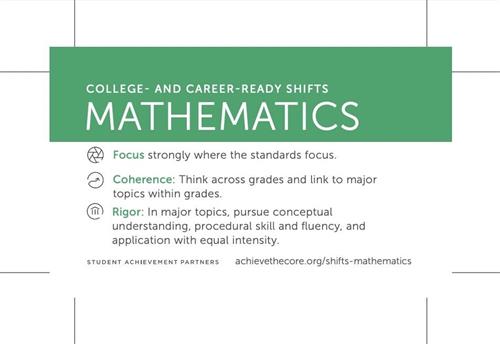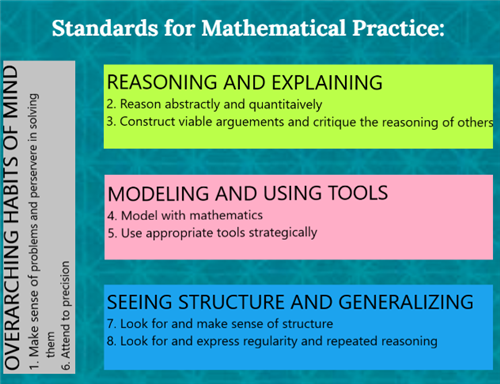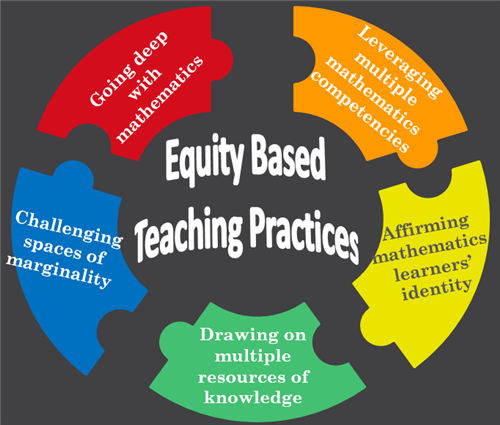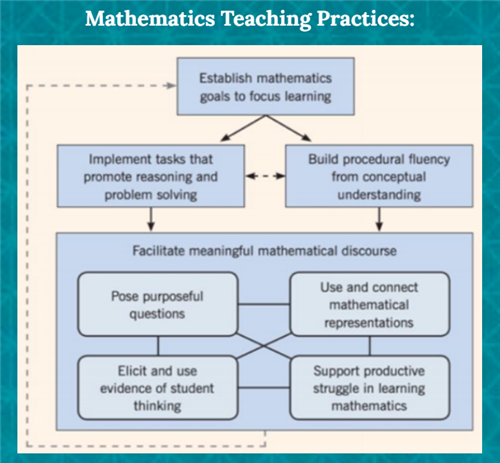- Batesville School District
- Mathematics Programs
Departments
Page Navigation
-
MATHEMATICS PROGRAMS
The Batesville School District is committed to putting Students First. One of the ways we do this is by building problem-solving math communities with Standards for Mathematical Practice — how our brains know and use math — to inform our mathematical teaching practices. Here you will find information about mathematical programs, research, and resources.
AR Math QuEST
-
AR Math QuEST
AR Math QuEST (Quantitative Essentials for Students and Teachers) is a journey for ambitious teaching that promotes equity and engagement of all students in meaningful mathematics learning experiences of reasoning and problem-solving. AR Math QuEST empowers educators and families to help students develop identities as doers of mathematics to increase student achievement. This student-centered approach to teaching math starts with what students already know and builds on their natural number sense and intuitive approaches to problem-solving. Problem-based learning is based on 30 years of research. It's a framework that helps teachers to understand how children's mathematical ideas develop and provides an opportunity to build on the child's own thinking and understanding. Problem-based learning is a critical thinking and application approach to learning mathematics through discovery, inquiry, and discourse.The goals are as follows:
- Eliminate achievement gaps
- Increase problem-solving and reasoning
- Build positive identities as doers of mathematics
Because of AR Math QuEST, the focus on math progression for your child has shifted from learning procedures with memorization to building procedural fluency and conceptual understanding through connection to meaning and application.
Mathematical Practice
-
Mathematical Practice
The NCTM's (National Council for Teachers of Mathematics) Mathematics Teaching Practices and the Standards for Mathematical Practice are the research-based foundation for exemplary teaching and learning. Ambitious mathematics teaching involves skilled ways of eliciting and responding to each and every student in the class so that they learn worthwhile mathematics and come to view themselves as competent mathematicians.In a mathematics class, students should not just learn about mathematics, they should do mathematics. This can be defined as engaging in the mathematical practices: making sense of problems, reasoning abstractly and quantitatively, making arguments and critiquing the reasoning of others, modeling with mathematics, making appropriate use of tools, attending to precision in their use of language, looking for and making use of structure, and expressing regularity in repeated reasoning.
This research has been conducted through TIMSS over the last three decades across the world, and it is derived from thousands of studies conducted in multiple countries. The Mathematics Practices and Ambitious Mathematics instruction has culminated in a preponderance of evidence to inform how mathematically proficient learners develop; why some have difficulty; and how we can most effectively assess and teach and, therefore, improve student outcomes through prevention of and intervention for mathematics difficulties.
Decades of research tells us that in order to learn mathematics, students should spend time in math class doing mathematics — Students learn mathematics as a result of solving problems. Mathematical ideas are the outcomes of the problem-solving experience rather than the elements that must be taught before problem-solving.
Teachers
-
Resources
- Why Number Talks
- Number Talks and Mental Math
- Number Talks as "Warm-ups"
- What is Eureka Math? Explained by a Math Teacher
- Eureka Math Parent Resources
- What is Zearn?
- Login to Zearn
- Khan Academy
- Digital Math Manipulatives
- Math Celebrity - Homework problem checker
- Desmos - Graphing Calculator
- Prodigy Math Game
- Reflex Math
- Subitizing Tree App
- Printable Math Resources
- Helping Your Child Learn Mathematics
- Math Tips for Parents
- What is Cognitively Guided Instruction?
- PBS Math
- IXL Math
-
Mathematics Program Information
-
Podcasts
- A Story of Units. - Eureka Math
- Students' units coordination activity: A cross-sectional analysis - Math Ed, Episode 1514: Anderson Norton
Parents
-
How can parents better understand the Standards for Mathematical Practice?
Learn about your child's number sense program.
Good number sense programs have a specific progression of lessons from easy skills to more difficult skills. Teaching should be explicit so that students build connections. The Batesville School District has adopted a comprehensive curriculum for K-5 — Eureka Math. While teaching counting principles, place value, and relational thinking, Eureka also builds students' knowledge and vocabulary in the coherence of design called "A Story of Units."Understand how counting principles are taught based on the Standards for Mathematical Practice.
These short activities should ask students to use the order sequence, one-to-one correspondence, and the cardinal principle. Check out this video on counting collections to get a better understanding of counting collectionsLearn which kinds of activities allow children to practice number sense skills.
As students learn counting principles, relationships between numbers and operations, and 10 as a unit in the place value system, they should have fluency activities that allow them to deepen the understanding they are mastering. A student can then apply these skills in problem solving. A student should not be shown "short cuts" or algorithms if they conceptual understanding of why is not in place. Zearn is a great resource for teachers and parentsUnderstand how math facts are taught based on the Standards for Mathematical Practice.
Students should learn fluency skills and place value to help them build conceptual understanding and procedural fluency. Teachers do not teach specific strategies for solving, but rather, present meaningful problem strings that focus on relational thinking and computational fluency. Rather than using flashcards to memorize long lists of math facts, students need to focus on the math and thinking behind just the answer. This will allow them to apply knowledge beyond just that memorized fact.Learn how computation is taught based on the Standards for Mathematical Practice.
Students should be learning how to use derived facts (math they know) and applying that known knowledge to problem-solve for what is unknown. Number Talks are a the way students build relational understanding and use what they know to figure what they do not know in math computation. This for all students in all grades.
Kindergarten video | 6th grade fractions videoLearn how student progress is monitored.Students should be assessed by each mathematical standard. Some guiding questions are: Can students demonstrate all counting principles? Can they manipulate numbers? Can they solve simple and more complex equations and word problems? Because percentage and letter grades may not correspond with specific skills, multiple assessments may be used to provide instructional guidance.Ask about specific skills that can be addressed at home.
Ask for activity ideas for you to use at home with your child based on specific skills identified through assessment. Check out the next page to find lots of helpful resources for parents or check out the Family Resources page at Great Minds for Eureka Math, the Family Resources page for Zearn, and Illustrative Math Information for Families page.
Math Instructional Resources for Teachers and Parents -
What is Zearn? Watch the video below to learn more:
- Zearn Login (Your child will use their school email and password to access - Login through Clever)
- Zearn for Families
K-Algebra I Curriculum
-
K-Algebra I Curriculum • Eureka Math & Illustrative Math
What is Eureka Math?
Thoughtfully constructed and designed like a story, Eureka Math is meticulously coherent, with an intense focus on key concepts that layer over time, creating enduring knowledge. Students gain a complete body of math knowledge, not just a discrete set of skills. They use the same models and problem-solving methods from grade to grade, so math concepts stay with them, year after year.- Kindergarten ‣ Curriculum Overview • 1st Quarter Curriculum Guide • 2nd Quarter Curriculum Guide • 3rd Quarter Curriculum Guide
- 1st Grade ‣ Curriculum Overview • 1st Quarter Curriculum Guide • 2nd Quarter Curriculum Guide • 3rd Quarter Curriculum Guide
- 2nd Grade ‣ Curriculum Overview • 1st Quarter Curriculum Guide • 2nd Quarter Curriculum Guide • 3rd Quarter Curriculum Guide
- 3rd Grade ‣ Curriculum Overview • 1st Quarter Curriculum Guide • 2nd Quarter Curriculum Guide • 3rd Quarter Curriculum Guide
- 4th Grade ‣ Curriculum Overview • 1st Quarter Curriculum Guide • 2nd Quarter Curriculum Guide • 3rd Quarter Curriculum Guide
- 5th Grade ‣ Curriculum Overview • 1st Quarter Curriculum Guide • 2nd Quarter Curriculum Guide • 3rd Quarter Curriculum Guide
What is Illustrative Math?
The Illustrative Mathematics curriculum provides teachers with coherently sequenced materials based on the standards and research-based learning trajectories to support students’ learning. Illustrative Mathematics is rigorous, problem-based, and fully aligned to the standards, with coherence across grade bands. Illustrative Math focuses on supporting teachers in the use of research-based instructional routines to successfully facilitate student learning, is highly rated by EdReports for meeting all expectations across all three review gateways, and the problem-based pedagogy that is the foundation of the IM curriculum will make the rigorous learning standards accessible to all learners.- 6th Grade ‣ Curriculum Overview • Accelerated Curriculum Overview
- 7th Grade ‣ Curriculum Overview • Accelerated Curriculum Overview
- 8th Grade ‣ Curriculum Overview
- Algebra I ‣ Curriculum Overview






